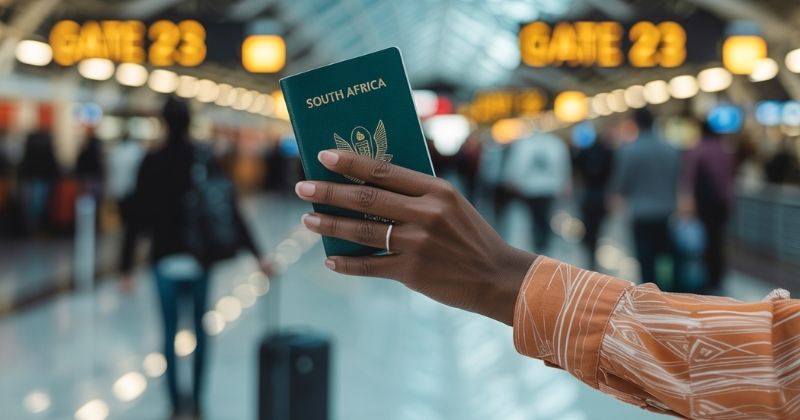
Passport strength is a key measure of a country’s global position, influencing how easily its citizens can travel, work, and connect internationally. The Henley Passport Index ranks passports by the number of destinations accessible without a prior visa, using exclusive International Air Transport Association (IATA) data verified by Henley & Partners. This ranking reveals global mobility patterns and shows where the South African passport stands compared with others, highlighting both current advantages and areas where stronger diplomatic efforts could expand travel freedom.
Key Takeaways
- Henley Passport Index Methodology: The Henley Passport Index ranks 199 passports against 227 destinations using IATA Timatic data, scoring destinations based on visa-free, visa on arrival, or ETA access, with political changes and new agreements influencing annual updates.
- South Africa’s Position: In 2025, the South African passport ranked 48th globally with visa-free or visa-on-arrival access to 106 destinations, its highest placement since 2014, and third strongest in Africa behind Seychelles and Mauritius.
- Global Mobility Gaps: The gap between the strongest and weakest passports is at its widest in 19 years, with Singapore offering access to 193 destinations compared to Afghanistan’s 26, underlining the importance of diplomatic ties and visa arrangements.
About Arcadia Finance
Arcadia Finance makes borrowing simple and secure. Access tailored options from 19 reputable lenders, fully compliant with the National Credit Regulator, with zero application fees and a streamlined approval journey.
The Henley Passport Index
The Henley Passport Index is recognised as the first and most authoritative system for ranking passports worldwide, measuring how many destinations a passport holder can enter without securing a visa in advance. This ranking is compiled using exclusive data from the International Air Transport Association (IATA), which operates the largest and most accurate global travel information database, and is further supported by detailed analysis from Henley & Partners’ research team.
How Henley & Partners Calculates Rankings
The Henley Passport Index is one of the most established global passport ranking systems, measuring passport strength by counting how many destinations can be visited without securing a visa beforehand. The calculation is based on exclusive data from the International Air Transport Association (IATA), which manages the Timatic database, a highly accurate source of global travel information. Henley & Partners supplements this with its own research and verification.
Each of the 199 passports is compared against 227 destinations, including countries, territories, and micro-states. The criteria require that the traveller is an adult citizen, travelling alone, for business or tourism, staying for at least three days, and using a standard passport. A destination that allows entry visa-free, via visa on arrival, a visitor’s permit, or an electronic travel authority (ETA) scores 1. If a visa must be obtained in advance, it scores 0. The total of these scores determines the passport’s position in the rankings.
Role of IATA Data, Annual Updates, and Policy Changes
The IATA Timatic database underpins the index with extensive and regularly updated information on visa requirements. While the index is monitored continuously, Henley & Partners releases formal updates quarterly or annually to reflect notable changes. Political developments, shifts in security policies, and new visa-waiver agreements can quickly impact rankings. A single high-value visa agreement can improve a country’s position, while new restrictions can cause it to fall.

Differences Between the Henley Passport Index and the VisaGuide Passport Index
| Feature | Henley Passport Index | VisaGuide Passport Index |
| Approach | Treats all destinations equally. | Uses a Destination Significance Score (DSS) to weight destinations. |
| Scoring Method | Assigns 1 for visa-free, visa on arrival, or ETA access, and 0 if a visa is required in advance. | Assigns different weights based on destination significance (GDP, tourism value, Human Development Index) and visa type. |
| Visa Type Weighting | All eligible visa types (visa-free, visa on arrival, ETA) receive the same score. | Visa-free and ETA get full value; visa on arrival slightly lower; e-Visa even lower; restricted or banned entry has a negative value. |
| Resulting Rankings | Can result in ties, with multiple passports sharing the same position. | Produces a unique score for each passport, avoiding ties. |
| Focus | Measures total number of destinations accessible without a prior visa. | Places more emphasis on the economic and strategic significance of each destination. |
Top 10 Strongest Passports Globally
| Rank | Country / Countries | Visa-Free / Visa-on-Arrival Destinations |
| 1 | Singapore | 193 |
| 2 | Japan, South Korea | 190 |
| 3 | Denmark, Finland, France, Germany, Ireland, Italy, Spain | 189 |
| 4 | Austria, Belgium, Luxembourg, Netherlands, Norway, Portugal, Sweden | 188 |
| 5 | Greece, New Zealand, Switzerland | 187 |
| 6 | United Kingdom | 186 |
| 7 | Australia, Czechia, Hungary, Malta, Poland | 185 |
| 8 | Canada, Estonia, United Arab Emirates | 184 |
| 9 | Croatia, Latvia, Slovakia, Slovenia | 183 |
| 10 | Iceland, Lithuania, United States | 182 |

Global Mobility Trends for 2025
Over the past several years, numerous nations have experienced changes in their ability to travel without a visa, with some countries improving their global access while others have seen a decline in rank. At the very bottom of the latest list sits Afghanistan, which has experienced a further reduction in its mobility by losing visa-free access to two more countries in the past year. This now leaves Afghan passport holders with entry to only 26 destinations worldwide.
This shift has resulted in the widest travel freedom gap recorded in the 19-year history of the index, with citizens of Singapore able to enter 169 more destinations without a visa than those holding an Afghan passport. The contrast illustrates how the concept of “passport privilege” has become increasingly relevant in determining the extent of a person’s ability to travel internationally.
Beyond the rankings, the current situation also underlines the growing link between citizenship, environmental change, and forced migration. Rising global temperatures, coupled with an increase in natural disasters, are displacing communities and making certain areas uninhabitable. At the same time, political unrest and armed conflict in several regions are compelling large numbers of people to leave their homes in pursuit of safety and stability elsewhere.
Biggest Movers
India recorded the largest improvement of any nation in the most recent six-month period, climbing from 85th to 77th place in the Henley & Partners passport rankings.
A review of the index covering the past ten years showed that the United Arab Emirates advanced by 34 positions. It was the only country with such a significant improvement to reach the global top ten within that timeframe.
China also moved up by 34 places over the last decade. This was regarded as particularly notable given that Chinese passport holders still do not enjoy visa-free travel to Europe’s Schengen Area.
At the other end of the scale, Afghanistan remained at the bottom of the list, with its passport providing visa-free entry to only 26 countries worldwide.
The South African Passport Moves Up Global Rankings
The 2025 Henley Passport Index, which uses information from the International Air Transport Association, shows that South Africa’s passport has strengthened its position in the global standings.
Currently placed 48th out of 199 passports, South African passport holders can travel to 106 destinations without requiring a visa. This marks an improvement of five places compared to the 2024 ranking and represents the highest global position for South Africa since 2014.
Within the African continent, the South African passport is now ranked among the top five strongest, with Seychelles leading the list, followed by Mauritius, South Africa, Botswana, and Namibia.
Why South Africa’s Passport Still Has Work To Do
The South African passport experienced a modest recovery in 2025, marking a positive change after roughly ten years of little movement and occasional declines. However, the difference between South Africa and the highest-ranking passports remains significant, with Singaporean passport holders able to travel to around 90 more destinations without needing a visa.
This gap is not simply about travel convenience. It reflects a country’s diplomatic strength, trade relationships, and the scope of reciprocal visa arrangements. The position of a passport on global rankings often mirrors a nation’s influence in international affairs and its ability to negotiate mobility rights for its citizens.
South Africa’s gradual improvement underlines a larger issue: the country has not pursued visa agreements with the urgency or breadth required to match top-tier mobility. In a period where global commerce, academic exchange, and cultural interaction depend heavily on the ability to travel quickly and with minimal restrictions, this lack of access places South Africans at a disadvantage.
But What About How Open South Africa Is?
The Henley Openness Index provides insight into how many nationalities a country allows to enter without a prior visa. This ranking offers a different perspective from the standard passport power index, focusing on inbound rather than outbound travel freedom.
South Africa is currently ranked 57th globally for openness, granting visa-free entry to 86 nationalities. While this level is higher than the United States, which permits entry for only 46 nationalities without a visa, it falls well short of highly open destinations such as Rwanda with 198 visa-free allowances and the Seychelles with 197. These higher levels of openness often support stronger tourism performance and make such countries more attractive to international investors.
For comparison, China, historically known for very restrictive entry requirements, has increased visa-free access to 75 countries from fewer than 20 just five years ago. This change has contributed to China’s climb of 34 positions on the Passport Index since 2015, demonstrating the close relationship between a country’s openness to visitors and the global strength of its own passport.

Conclusion
The 2025 Henley Passport Index highlights both the strengths and limitations of South Africa’s global travel freedom. While the country’s passport has reached its highest ranking in over a decade at 48th, allowing access to 106 destinations without a prior visa, it remains far behind the top-tier passports that grant near-universal mobility. This gap reflects broader diplomatic and economic realities, where reciprocal agreements and international influence play a significant role in shaping mobility. For South Africa, expanding visa-waiver treaties, improving international relations, and adopting strategies that increase openness could be key to strengthening its passport’s position in the years ahead.
Frequently Asked Questions
The Henley Passport Index is a global ranking system that evaluates the travel freedom of standard passports by counting the number of destinations their holders can enter without needing to secure a visa beforehand. It relies on exclusive International Air Transport Association (IATA) data, regularly updated to reflect changes in visa regulations, and is supplemented by additional analysis from Henley & Partners’ research team.
In 2025, the South African passport holds the 48th position globally, offering visa-free or visa-on-arrival entry to 106 destinations. This is a rise of five places from the 2024 ranking and represents the country’s highest position since 2014, showing measurable improvement in its international mobility.
Two African nations rank higher than South Africa in the current standings. Seychelles leads with visa-free or visa-on-arrival access to 156 destinations, while Mauritius follows with 149 destinations. South Africa is third in the continent, ahead of other relatively strong passports such as Botswana and Namibia.
The Henley Passport Index gives equal weight to all destinations, scoring 1 for visa-free, visa on arrival, or electronic travel authority (ETA) access, and 0 for destinations requiring a visa in advance. The VisaGuide Passport Index, however, applies a Destination Significance Score that weights destinations based on economic, tourism, and development factors, and assigns different values depending on visa type.
South Africa could improve its ranking by negotiating more bilateral visa-waiver agreements, enhancing trade partnerships, and adopting policies that increase inbound openness. These steps can strengthen diplomatic ties and encourage reciprocal travel arrangements with high-value destinations.
Fast, uncomplicated, and trustworthy loan comparisons
At Arcadia Finance, you can compare loan offers from multiple lenders with no obligation and free of charge. Get a clear overview of your options and choose the best deal for you.
Fill out our form today to easily compare interest rates from 19 banks and find the right loan for you.


